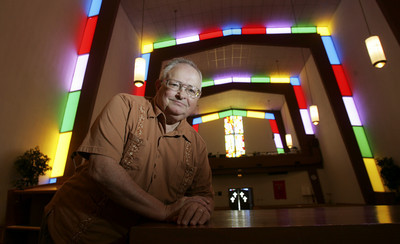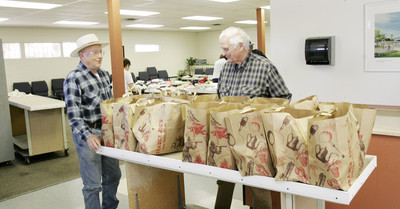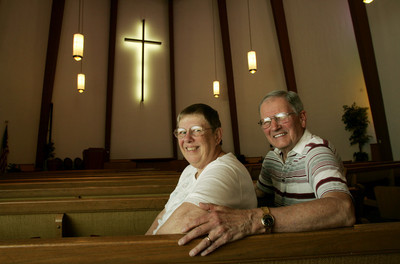Celebrating Service
Throughout its 75-year history in the valley, the First Congregational Church/United Church of Christ has experienced a few growing pains, name and affiliation changes and even a splintering of the congregation.
Regardless of the challenges, the church has maintained its focus on a singular mission: serving the community.
The congregation will mark the church's 75th anniversary in Southern Nevada with a special sermon, reception and a potluck luncheon at 10 a.m. today
Despite its longtime presence in the valley, chances are good you haven't even heard of the First Congregational Church/United Church of Christ. At 1200 N. Eastern Ave., it's in an older part of town and has about 80 members.
And if you have heard of it, says the Rev. Dave Pomeroy, you may have confused it with the Church of Christ. But there's a big difference between the two, and the word "united" best describes it: One is conservative, the other is not.
The United Church of Christ is the smallest of the five mainline Protestant churches, Pomeroy says, but it is perhaps the most liberal. Last year, the local congregation voted to officially become open and affirming to gay people as well as support their right to marriage.
Minor differences in doctrine tend to separate one Christian denomination from another, Pomeroy says, but their stance on gay and women's rights makes the First Congregational Church/United Church of Christ stand out.
"So many parts of the Christian church in particular have been negative toward homosexual people and have fostered stereotypes about them," Pomeroy says. "To be able to affirm a stance that we are all equal in God's eyes is something we feel is important to do."
The authority lies with the congregation in a Congregational church, as opposed to a bishop or other entity, Pomeroy explains. The United Church of Christ does have a national council that recommends positions, but the local churches don't have to adopt them.
That independent attitude is another hallmark of the religion, which has its roots in Puritanism, ironically.
"We will endeavor as a church to give you as much of a guide to spirituality as possible, but in the end you formulate your own set of beliefs," Pomeroy says of their liberal theology.
The theology is only one reason parishioners are drawn to the church. They also come because they want to worship in a place where they feel welcomed, Pomeroy says.
"Then there are those who come because they want to be connected to our community," he adds.
Three outreach programs give parishioners the opportunity to help the needy. The food pantry distributes bags of food to about 80 people the third Friday of every month. Church volunteers also obtain donated day-old bread and pastries from local grocery stores and distribute them, as well. Two years ago, the church opened a thrift shop, selling clothes for 50 cents to $1 per item.
The church was founded on the basic principles of inclusion and service, says First Congregational Church/United Church of Christ historian Grace Schmiedel.
She and her husband, Don, joined the church in 1965.
In 1931, the Meltons, a Methodist missionary couple from Missouri started a Sunday school in North Las Vegas, Schmiedel says. Seven people in all attended lessons. That school grew into the Immanuel Community Church in 1934. It had grown to 10 members.
Immanuel Community Church had no denominational affiliation, at first, Schmiedel says, but was governed by the congregation.
"One of the first things the church did was to give food to people who needed it," Schmiedel says.
The founder, Albert Melton, bought groceries at wholesale prices then distributed them to the poor, she explains.
The rapidly expanding church asked to affiliate with the Methodist church in 1940, Schmiedel says. The request was denied because there already was a Methodist church in Las Vegas and Immanuel's location, surrounded by a shantytown full of the poor and out-of-work, was less than ideal.
"The Congregational Christians were looking for churches to affiliate with them, so Immanuel voted to affiliate with them in November, 1940," Schmiedel says.
A large number of people joined the church in 1963, bringing the size of the congregation to about 250 people. Many parishioners thought that the name Immanuel Community Church was too vague.
"They wanted to change the name because Immanuel Community Church really didn't say who we were," Schmiedel says.
Because it seemed they would continue to grow, the name was changed in 1964 to First Congregational Church/United Church of Christ, Schmiedel says.
"They thought it would be the mother church, that's why they called it the first," says Schmiedel, who gathered her information about the church by studying church documents and old newsletters.
The next Congregational church in the valley didn't come along until 1967, and the denomination never took a foothold in Southern Nevada the way it did in other parts of the country.
In the first few decades of the church's existence, members came from the surrounding community. But by 2001, that community had changed and the majority of members lived elsewhere. Not surprisingly, some parishioners wanted to move the church to a growing part of town, Schmiedel says.
A handful of them broke off and formed the Northwest Community Church, which now has 200 members and is celebrating its eighth year today. Rents were too high to maintain separate churches, though. Last year, Northwest moved its services to the First Congregational Church/United Church of Christ building, Pomeroy says.
There even has been talk of merging the two congregations at some point, although Pomeroy says that is not a priority.
The Congregational Christian Church of American Samoa, with about 200 members, has been a partner church with First Congregational Church/United Church of Christ for six years, using the same building for its services. Today, that church also will mark its acceptance into the Southern California Nevada Conference as a church in covenant development.
The anniversary celebration is open to the public.
Contact reporter Sonya Padgett at spadgett@reviewjournal.com or 702-380-4564.



















